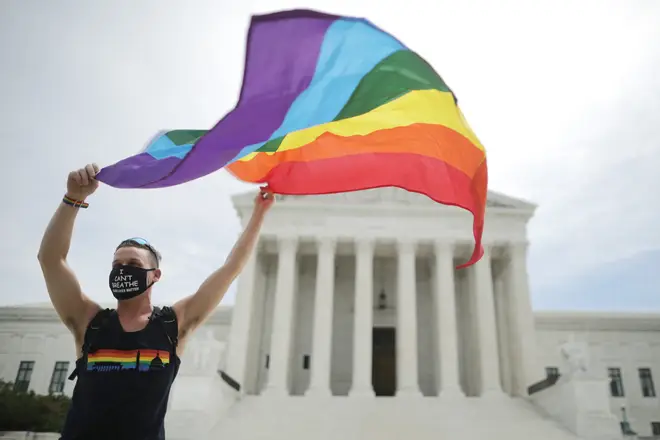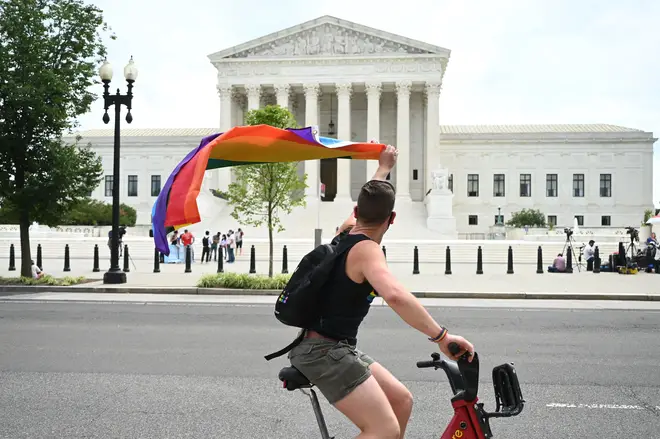
Matt Frei 10am - 1pm
15 June 2020, 19:27

The US Supreme Court has passed a landmark civil rights law that protects LGBT workers from being discriminated against by their employers.
America's top court ruled by a 6-3 vote that gay, lesbian and transgender people cannot be fired on the basis of their sexuality.
The ruling found the federal law, known as Title VII in the Civil Rights Act of 1964, which prohibits discrimination based on sex, should also include sexual orientation and gender identity.
It is a significant victory for the estimated 8.1 million LGBT workers in the country as most states do not offer protection from discrimination in the workplace.
Roughly 11.3 million LGBT people live in the US, according to the Williams Institute at the UCLA law school.
The move comes despite the court's current makeup of more conservative-leaning judges.
Read more: Boris Johnson 'to scrap plans to make gender change easier'
Read more: Trump administration approves regulation to revoke transgender health protection

"I'm 51 and gay, but I can't come out"
Justice Neil Gorsuch wrote for the court: "An employer who fires an individual for being homosexual or transgender fires that person for traits or actions it would not have questioned in members of a different sex.
"Sex plays a necessary and undisguisable role in the decision, exactly what Title VII forbids."
Justices Samuel Alito, Brett Kavanaugh and Clarence Thomas dissented.
Writing in the dissent, Mr Alito said: "The Court tries to convince readers that it is merely enforcing the terms of the statute, but that is preposterous.
"Even as understood today, the concept of discrimination because of 'sex' is different from discrimination because of 'sexual orientation' or 'gender identity'."
Mr Kavanaugh wrote in a separate dissent that the court was rewriting the law to include gender identity and sexual orientation, a job that he said belongs to Congress.
However, Mr Kavanaugh said the decision does represent an "important victory achieved today by gay and lesbian Americans."

The ruling is unlikely to be the court's final word on a number of issues concerning LGBT rights, Mr Gorsuch added.
Upcoming lawsuits include the issue of transgender athletes participating in school sporting events, while judges will also have to preside over rulings on sex-segregated bathrooms and locker rooms, a topic that justices seemed concerned about during arguments in October.
Employers who have religious objections to employing LGBT people might also be able to raise those claims in a separate case, Mr Gorsuch said.
"But none of these other laws are before us; we have not had the benefit of adversarial testing about the meaning of their terms, and we do not prejudge any such question today," he wrote.
The cases were the court's first on LGBT rights since the retirement of Justice Anthony Kennedy, who was replaced by Mr Kavanaugh who is generally considered more conservative.
Mr Kennedy was a voice for gay rights and the author of the 2015 landmark ruling that made same-sex marriage legal throughout the country.
President Donald Trump's administration had changed course from that of former President Barack Obama's, which supported LGBT workers in their discrimination claims under Title VII.